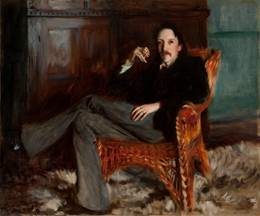
A flick of the brush and you have a cuff, a vein, a Légion d’honneur. The vivacious ability of John Singer Sargent (1856-1925) is now on show at London’s National Portrait Gallery. The friends of the celebrity portrait painter have arrived en masse for the exhibition Sargent: Portraits of Artists and Friends which explores the American painter’s career through some of the many of the the portraits he painted. Sargent was a chap whose friends included Robert Louis Stevenson, Claude Monet and Auguste Rodin amongst other stars of culture and his accomplished brush has caught them all in intimate and informal images.

Robert Louis Stevenson by John Singer Sargent, 1887 © Courtesy of the Taft Museum of Art, Cincinnati, Ohio
Amongst these often uncommissioned, informal portraits it is possible to discern three distinct periods in Sargent’s artistic life. An early, enjoyable time of thrashing paint around, painting small-scale experimental works with bravura skill – such as his portrait of fellow student Charles Stuart Forbes, left unfinished around the edges to focus attention on the speedily, broadly-worked face. A short final period of similarly lightly-worked pieces painted for kicks and giggles shows a preference for landscape that his career had not allowed. The larger central part of his work is – by his exuberant standards – more polished and laboured, more serious and less enjoyable. An industrial outpouring of an elegant craft, repeated to please different . Sargent could paint but his talent was used to record bourgeois snapshots
The two works Fete Familiale and Le Verre de Porto show how his choice of subjects anticipated candid photography. His cropping of scenes could be achieved yesterday with photoshop to lose a child pulling an ugly face on the side of the table.
The show includes his dashed-off portrait of his teacher Carolus-Duran that set him on the road to stardom after its success at the 1879 Paris Salon. Missing is the famous portrait of Madame X which scandalised Paris owing to the – to today’s eyes distinctly un-outrageous – slipping of the wearer’s dress strap over her shoulder. Quelle horreur! This forced him to move to England, a seemingly retrograde step where actually his career took off.
Curator Richard Ormond has done a great job, the low-lit galleries looking good with the rows of elegant portraits. His stated aim for the exhibition is ‘to challenge the conventional view of Sargent. As a painter he is well known; but Sargent the intellectual, the connoisseur of music, the literary polymath, is something new.’ It doesn’t achieve this, but rather shows that Sargent absorbed some of the lessons of Impressionism, whilst keeping the lucrative subject matter of the rich and famous.
12 February – 25 May 2015

Leave a Reply